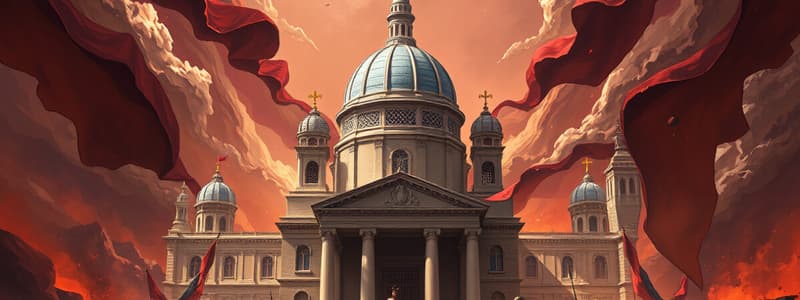Podcast
Questions and Answers
What is the definition of a monarch?
What is the definition of a monarch?
Monarchy is a form of government that is headed by a single ruler like a king, queen, or emperor.
How do you become a monarch?
How do you become a monarch?
You inherit the power and are expected to rule for life.
What kind of power does a monarch have?
What kind of power does a monarch have?
Most monarchs today have limited power based on a constitution.
What are three advantages of a monarch? (Select all that apply)
What are three advantages of a monarch? (Select all that apply)
What are three disadvantages of a monarch? (Select all that apply)
What are three disadvantages of a monarch? (Select all that apply)
What is the definition of a dictatorship?
What is the definition of a dictatorship?
How does one establish a dictatorship?
How does one establish a dictatorship?
How many people are typically in charge of a dictatorship?
How many people are typically in charge of a dictatorship?
What are two advantages of a dictatorship? (Select all that apply)
What are two advantages of a dictatorship? (Select all that apply)
What are three disadvantages of a dictatorship? (Select all that apply)
What are three disadvantages of a dictatorship? (Select all that apply)
Flashcards are hidden until you start studying
Study Notes
Monarchy
- A monarchy is governed by a single ruler, such as a king, queen, or emperor.
- Power is typically inherited, passed down through royal families, with monarchs ruling for life.
- Most modern monarchs have limited roles, often serving as ceremonial heads of state, exemplified by the UK monarchy.
Advantages of Monarchy
- Clear succession is established, as the next in line for the throne is known.
- A ruling monarch with complete power can make decisions independently.
- Monarchies can foster strong national loyalty and unity among the populace.
Disadvantages of Monarchy
- Ineffectual successors can follow effective monarchs, leading to governance issues.
- Modern nations often pose challenges for a single monarch to effectively manage.
- Monarchs with absolute power may make detrimental choices affecting the nation.
Dictatorship
- A dictatorship is a form of government seized and maintained by force.
- Dictators typically rise to power after violently overthrowing existing governments, often in times of crisis or instability.
- Dictatorships can be led by an individual, frequently a military leader, or a coalition of military officials.
Advantages of Dictatorship
- A sole leader can implement decisions and policies rapidly and effectively.
- Dictators can maintain peace and order more easily due to control over security forces like the military and police.
Disadvantages of Dictatorship
- Political dissent can lead to severe repercussions for citizens, including unjust imprisonment, torture, or execution.
- Citizens' rights are at significant risk and often are blatantly disregarded under a dictatorship.
- The oppressive nature of a dictatorship can incite civil unrest, riots, or even civil war aimed at removal of the dictator.
Studying That Suits You
Use AI to generate personalized quizzes and flashcards to suit your learning preferences.




